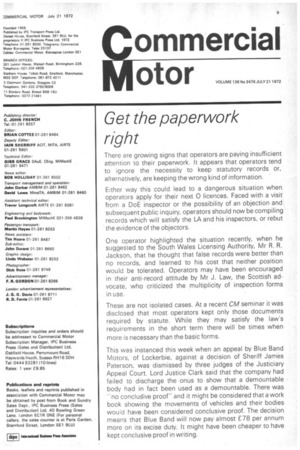Get the paperwork right
Page 11

If you've noticed an error in this article please click here to report it so we can fix it.
There are growing signs that operators are paying insufficient attention to their paperwork. It appears that operators tend to ignore the necessity to keep statutory records or, alternatively, are keeping the wrong kind of information.
Either way this could lead to a dangerous situation when operators apply for their next 0 licences. Faced with a visit from a DoE inspector or the possibility of an objection and subsequent public inquiry, operators should now be compiling records which will satisfy the LA and his inspectors, or rebut the evidence of the objectors.
One operator highlighted the situation recently, when he suggested to the South Wales Licensing Authority, Mr R. R. Jackson, that he thought that false records were better than no records, and learned to his cost that neither position would be tolerated. Operators may have been encouraged in their anti-record attitude by Mr J. Law, the Scottish advocate, who criticized the multiplicity of inspection forms in use.
These are not isolated cases. At a recent CM seminar it was disclosed that most operators kept only those documents required by statute. While they may satisfy the law's requirements in the short term there will be times when
more is necessary than the basic forms.
This was instanced this week when an appeal by Blue Band Motors, of Lockerbie, against a decision of Sheriff James Paterson, was dismissed by three judges of the Justiciary Appeal Court. Lord Justice Clark said that the company had failed to discharge the onus to show that a demountable body had in fact been used as a demountable. There was -no conclugive proof" and it might be considered that a work book showing the movements of vehicles and their bodies would have been considered conclusive proof. The decision means that Blue Band will now pay almost £78 per annum more on its excise duty. It might have been cheaper to have kept conclusive proof in writing.




























































































